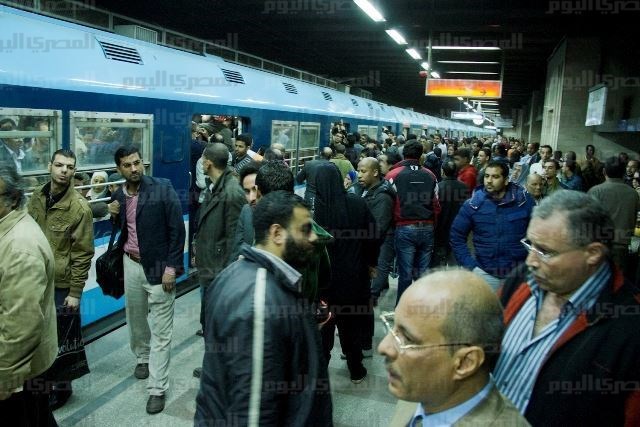Scattered throughout Cairo’s metro stations are vendors who sell anything from Egyptian flags and pins, to plastic shoes and doorbells.
In recent months, the number of vendors seen on the metro has steadily increased as, aside from the mass disruption of work due to the protests beginning on 8 July, the convenience of running a rent-free, portable shop has proved rather attractive.
Cairo’s metro vendors constitute an example of how people are adapting practically to the ongoing turmoil.
“Before the revolution, I was a plumber making about LE2000 a month,” states Nasser Osman, a vendor of ceramic elephants and bottle openers at Sadat station beneath Tahrir Square. “Now, because I can’t find work, I have turned to selling things in metro stations and only make about LE20 per day."
When asked about whether his change in income was upsetting, Osman stated that he sees it as his duty to his country, as well as the role God needs him to play in order to achieve democracy.
Every metro vendor interviewed for this article shared Osman's attitude to some degree. All confirmed their belief that financial issues are secondary to the bigger picture.
“Now you see that the metro stations and Tahrir Square are full of people like me selling things,” stated Ghafer Said, who sells revolution-style merchandise at Dokki metro station. “When the revolution is over, most of the metro vendors at Tahrir Square will be cleared out, and the traces cleaned. This will symbolize that our duty is done.
”In an attempt to prove how this line of work is a pleasurable duty, Said offered this reporter free flags, pins and photos.
Cairo’s metro vendors are a great source of household items, as they carry almost anything one could need.
While initially it may appear that each vendor carries a random assortment of items, the vendors argue that what they do has a science.
“We work according to the market,” states Ismail Hamam, a 19-year-old vendor at Bohouth metro station who has been a metro vendor for three years. “Obviously in summertime people are going to buy water and juice, so I stock up on those. But then in the wintertime, people will buy more books and electrical items.”
“Kitchenware is popular all year, but the color that people choose changes, and so I try to carry items accordingly,” he added.
The items that the vendors hold come from a variety of sources. Some have friends with souvenir shops in Sharm and Hurghada who are looking to make more business in Cairo. Others are in direct contact with distributors and own the items themselves. The revolutionary items, flags and pins, come from an old factory close to Tahrir that was reinvigorated during the revolution.
Metro vendors are also able to offer great prices on their stock due to minimized fixed costs (rent, electricity, etc.) resulting from the lack of an official outlet. This lack of a need for an official store allows portability and a work schedule flexibility that the majority of vendors, being young in age, enjoy, allowing them to join in the protests whenever they wish. “Whenever there’s a big date coming up, I’ll start out early,” said Ali Hendawy, 22, a vendor for keychains and electric shavers at Maadi metro station. “Then whenever I want to leave, I can roll up my items into a backpack with rope, and head to Tahrir.”
Apparently, before the revolution, police officers would visit Cairo’s metro vendors, take what they wanted from their stalls, destroy the rest of their merchandise, and then jail the vendors for days. Later, the vendor would be released to an unfamiliar location without money or belongings. Now, that has stopped to a certain degree, so the vendors say.
“Before the revolution, working as a metro vendor was a very frightening job,” said Hussein, 24, a vendor who chose not to disclose his full name. “Every week another vendor would be picked on and would disappear for a few days. Thankfully now the youth and the people have more control, and so this doesn’t happen as often as it used to.”
As this reporter took his last photo of Bohouth metro station in Dokki and bid his farewells to the friendly vendors, two police officers approached him and asked for ID, suggesting that his foreign looks and camera made him suspect. According to the police officers, it is illegal to take photos of Cairo’s metro stations. After learning that he was Egyptian, he was dragged to the police station, interrogated and sent directly to jail.
Fortunately, shouting and vehemently resisting arrest was helpful; a personal friend drove by coincidentally and was able to settle the matter. The police officers then said that the metro vendors were trying to attack this reporter, and that they were trying to help him out by taking him somewhere safe.

